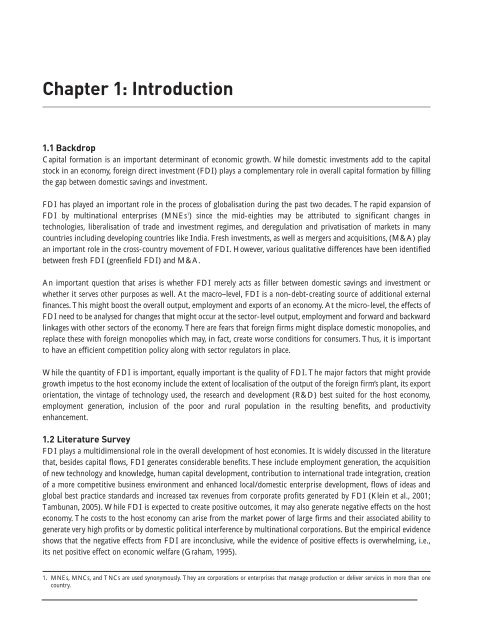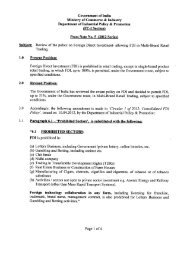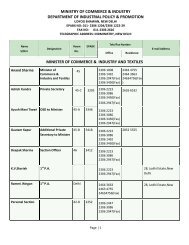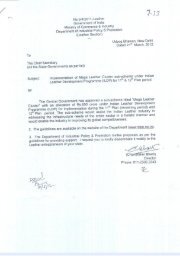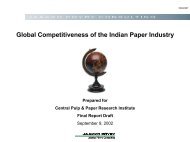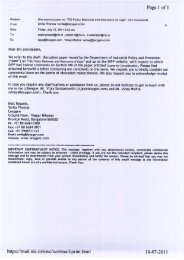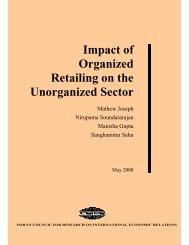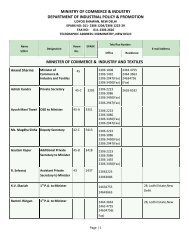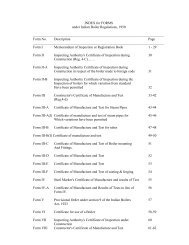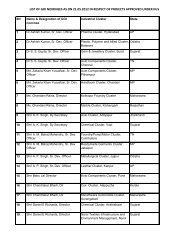fdi in india and its growth linkages - Department Of Industrial Policy ...
fdi in india and its growth linkages - Department Of Industrial Policy ...
fdi in india and its growth linkages - Department Of Industrial Policy ...
Create successful ePaper yourself
Turn your PDF publications into a flip-book with our unique Google optimized e-Paper software.
Chapter 1: Introduction<br />
1.1 Backdrop<br />
Capital formation is an important determ<strong>in</strong>ant of economic <strong>growth</strong>. While domestic <strong>in</strong>vestments add to the capital<br />
stock <strong>in</strong> an economy, foreign direct <strong>in</strong>vestment (FDI) plays a complementary role <strong>in</strong> overall capital formation by fill<strong>in</strong>g<br />
the gap between domestic sav<strong>in</strong>gs <strong>and</strong> <strong>in</strong>vestment.<br />
FDI has played an important role <strong>in</strong> the process of globalisation dur<strong>in</strong>g the past two decades. The rapid expansion of<br />
FDI by mult<strong>in</strong>ational enterprises (MNEs 1 ) s<strong>in</strong>ce the mid-eighties may be attributed to significant changes <strong>in</strong><br />
technologies, liberalisation of trade <strong>and</strong> <strong>in</strong>vestment regimes, <strong>and</strong> deregulation <strong>and</strong> privatisation of markets <strong>in</strong> many<br />
countries <strong>in</strong>clud<strong>in</strong>g develop<strong>in</strong>g countries like India. Fresh <strong>in</strong>vestments, as well as mergers <strong>and</strong> acquisitions, (M&A) play<br />
an important role <strong>in</strong> the cross-country movement of FDI. However, various qualitative differences have been identified<br />
between fresh FDI (greenfield FDI) <strong>and</strong> M&A.<br />
An important question that arises is whether FDI merely acts as filler between domestic sav<strong>in</strong>gs <strong>and</strong> <strong>in</strong>vestment or<br />
whether it serves other purposes as well. At the macro–level, FDI is a non-debt-creat<strong>in</strong>g source of additional external<br />
f<strong>in</strong>ances. This might boost the overall output, employment <strong>and</strong> exports of an economy. At the micro-level, the effects of<br />
FDI need to be analysed for changes that might occur at the sector-level output, employment <strong>and</strong> forward <strong>and</strong> backward<br />
l<strong>in</strong>kages with other sectors of the economy. There are fears that foreign firms might displace domestic monopolies, <strong>and</strong><br />
replace these with foreign monopolies which may, <strong>in</strong> fact, create worse conditions for consumers. Thus, it is important<br />
to have an efficient competition policy along with sector regulators <strong>in</strong> place.<br />
While the quantity of FDI is important, equally important is the quality of FDI. The major factors that might provide<br />
<strong>growth</strong> impetus to the host economy <strong>in</strong>clude the extent of localisation of the output of the foreign firm’s plant, <strong>its</strong> export<br />
orientation, the v<strong>in</strong>tage of technology used, the research <strong>and</strong> development (R&D) best suited for the host economy,<br />
employment generation, <strong>in</strong>clusion of the poor <strong>and</strong> rural population <strong>in</strong> the result<strong>in</strong>g benef<strong>its</strong>, <strong>and</strong> productivity<br />
enhancement.<br />
1.2 Literature Survey<br />
FDI plays a multidimensional role <strong>in</strong> the overall development of host economies. It is widely discussed <strong>in</strong> the literature<br />
that, besides capital flows, FDI generates considerable benef<strong>its</strong>. These <strong>in</strong>clude employment generation, the acquisition<br />
of new technology <strong>and</strong> knowledge, human capital development, contribution to <strong>in</strong>ternational trade <strong>in</strong>tegration, creation<br />
of a more competitive bus<strong>in</strong>ess environment <strong>and</strong> enhanced local/domestic enterprise development, flows of ideas <strong>and</strong><br />
global best practice st<strong>and</strong>ards <strong>and</strong> <strong>in</strong>creased tax revenues from corporate prof<strong>its</strong> generated by FDI (Kle<strong>in</strong> et al., 2001;<br />
Tambunan, 2005). While FDI is expected to create positive outcomes, it may also generate negative effects on the host<br />
economy. The costs to the host economy can arise from the market power of large firms <strong>and</strong> their associated ability to<br />
generate very high prof<strong>its</strong> or by domestic political <strong>in</strong>terference by mult<strong>in</strong>ational corporations. But the empirical evidence<br />
shows that the negative effects from FDI are <strong>in</strong>conclusive, while the evidence of positive effects is overwhelm<strong>in</strong>g, i.e.,<br />
<strong>its</strong> net positive effect on economic welfare (Graham, 1995).<br />
1. MNEs, MNCs, <strong>and</strong> TNCs are used synonymously. They are corporations or enterprises that manage production or deliver services <strong>in</strong> more than one<br />
country.


